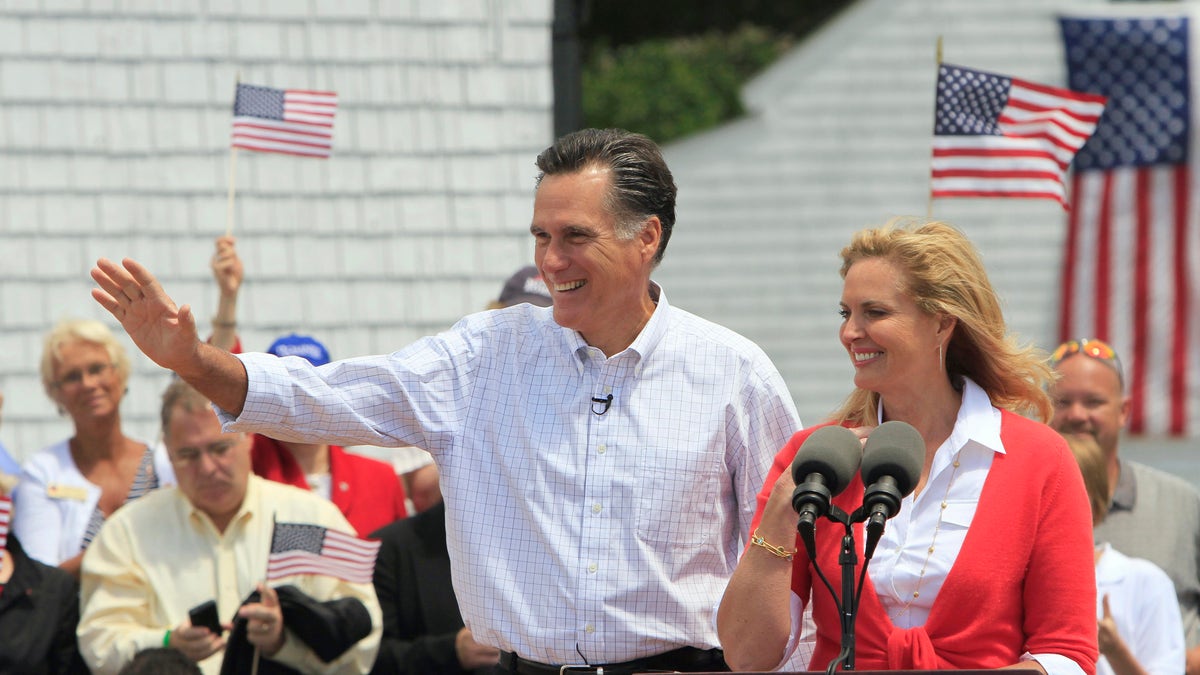
Former Massachusetts Gov. Mitt Romney, accompanied by his wife Ann, arrives to announce his 2012 candidacy for president, Thursday, June 2, 2011, in Stratham, N.H. (AP) (AP2011)
Mitt Romney, who's been the presumed frontrunner in the 2012 GOP presidential field for months now, didn't make his bid official until last week. Now, with the former Massachusetts governor getting hit from all sides, it's easy to see why he waited so long.
Conservatives are pooh-poohing his past stance on global warming and the health care program he helped establish in his state. Democrats are accusing him of being a flip-flopper on social issues like gay marriage and abortion right. And some in his native Michigan are calling him an enemy of the auto industry for his opposition to a multibillion-dollar federal bailout for General Motors and Chrysler.
"The frontrunner gets attacked, and until he announced, he couldn't be the target," said Kathleen Kendall, a research professor of communication at the University of Maryland and an expert on presidential primaries. "Now he's the target."
The attacks may only intensify now that Newt Gingrich's campaign imploded this week when his entire senior staff resigned en masse. Gingrich has vowed to start anew this weekend.
The Romney campaign says it's not worried about the big target on its back.
"Governor Romney is focused on talking to voters and discussing why he's the best candidate to create jobs and turn around the economy," Romney campaign spokesman Ryan Williams told FoxNews.com when asked about political attacks.
Williams rejected the notion that the timing of Romney's presidential announcement was based on avoiding the early attacks that frontrunners typically endure.
"Governor Romney decided to announce his campaign when he felt it was the right time," he said.
Romney's frontrunner status was cemented with a couple of new polls this week.
A Fox News poll shows that 23 percent of Republican primary voters prefer Romney as the nominee, followed by former New York City Mayor Rudy Giuliani at 13 percent and former Alaska Gov. Sarah Palin at 12 percent.
An ABC News/Washington Post poll found that Romney was running evenly with President Obama in a general election, leading him 49-46 percent among registered voters.
But as the clear frontrunner, Romney has emerged as a punching bag even in his native Michigan, the only state he won in the 2008 presidential primary season. Tthis week, he received a mixed reception during campaign stops in and around Detroit because of his position during his first campaign that automakers should have gone through a private bankruptcy without federal aid.
The Michigan Democratic Party called him a hypocrite.
"Mitt Romney's Michigan Hypocrisy Tour won't be the happy homecoming he's hoping for," the group's chairman, Mark Brewer, said in a written statement. "In fact, I don't think we've seen a less inviting homecoming since LeBron (James) went back to Cleveland."
But Romney didn't back down Thursday, even as Michigan autoworkers protesting his campaign appearances pointed to the companies' resurgence as a sign Romney was wrong.
"Some people believe in bailouts. I believe in the process of the law," Romney told reporters. "The idea of just writing a check, which is what the auto executives were asking for, was not the right course. ... It would have been best had the auto companies gone through the bankruptcy process without having taken $17 billion from government."
Romney's late father, George Romney, led American Motors from 1954 to 1962 before he became Michigan governor in the 1960s.
Democrats, including President Obama, have trumpeted the federal intervention as a triumph, stressing that the companies are now doing well after going through bankruptcy and then restructuring. Chrysler has repaid most of the $10.5 billion in taxpayer money that it received. GM has paid back just over half of its $50 billion in aid and is regaining market share. Together the companies have added about 50,000 jobs nationwide. The White House says the bailout ultimately will cost taxpayers $14 billion, far less than expected.
Although Romney and Obama differ on the auto bailout, Michigan Rep. Thaddeus McCotter -- who's contemplating his own Republican presidential run -- criticized Romney for being too similar to the Democratic president on issues such as health care and bailing out the financial services sector.
"The people who are struggling to get this economy going ... will see that President Obama and Mr. Romney are less rivals than running mates," the congressman said in a written statement.
Kendall told FoxNews.com that frontrunners weather the inevitable attacks on them by attacking the incumbent.
"You want the attention to focus on you as the presumed nominee who's going to run against Obama," she said. "Your focus is going to be the Obama administration rather than other candidates."
Romney didn't deviate from the script during his Michigan appearances, slamming Obama for the slow pace of the economic recovery in Michigan and the U.S.
"The economy overall has been terribly managed by the president. I don't think there's any way he can defend his economic record," Romney told reporters.












































